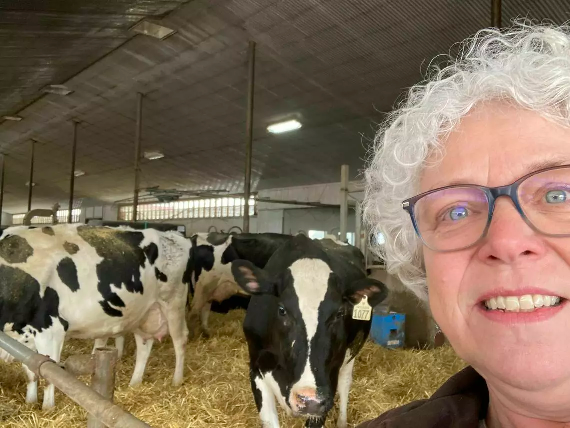A career in cattle health was an unexpected choice for Dr. Karin Orsel.
She surprised many of her friends and family in the Netherlands when she enrolled in veterinary school at the age of 18. But Orsel's determination to enter the field of animal care was never in doubt.
"I'm not from a rural background, but the complexity of pathogens has always intrigued me. It became the base of my research," says Orsel, DVM, PhD, now a professor (teaching and research) at the University of Calgary's Faculty of Veterinary Medicine (UCVM). "It forces you to think about the complexity of the environment the animals are in and the management they are under. My brain is always going to: what does that mean for the rest of the herd?"
As a bovine epidemiologist, Orsel studies the transmission and risk factors of diseases that affect beef and dairy cattle. With herd health as the main driver, her work aims to translate research findings into practical prevention and control strategies to help producers improve cattle welfare.
Understanding cattle health challenges
Cattle lameness a serious condition significantly affecting animal welfare and productivity has been one of Orsel's primary research areas for more than 15 years. She was initially driven by challenges in the dairy industry but later expanded her research to beef cattle.
"Dairy cows are housed indoors, which is not the most natural environment for them," says Orsel. "We had a lot of challenges with an infectious foot disease called digital dermatitis. We realized that the lameness problems in the beef industry are of a decent magnitude, as well. The most important health disorder in beef cattle is pneumonia, so much so that we forgot about lameness, which is a concern."
Despite its lower profile, lameness is a major cause of animal suffering and suboptimal production.
In beef cattle, Orsel's research also focuses on how animal behaviour can indicate disease and overall health. She has conducted several studies looking at the impact of disease transmission and pain-related components on cows in feedlots and pasture.

Dr. Orsel smiles next to dairy cow. Photo Credit: Karin Orsel
Community and sustainability
For Orsel, sustainability is a vital concept and a driver for many research questions posed by the dairy and beef industries.
"Part of sustainability is to strive for healthier populations. Animals can still be productive despite being affected by diseases," says Orsel. "We can have a sustainable, but also a very good production system that allows people to consume products from agriculture in a very ethical way. I've always been interested in the balance between animal welfare, productivity and economics."
Orsel's research at UCVM is not conducted in isolation. It's deeply intertwined with the community through partnerships with industry stakeholders such as Alberta Milk, Western Milk Pool and Alberta Beef. This support is complemented by provincial funding agencies that focus on putting research into practice.
Orsel's interdisciplinary approach involves collaboration with microbiologists, immunologists and welfare experts to tackle these multifaceted challenges. Her colleagues include fellow UCVM professors Dr. Jeroen De Buck, PhD; Dr. Eduardo Cobo, DVM, PhD; and Dr. Ed Pajor, PhD.
"We work as a multidisciplinary team to help the industry move forward and strive for healthier cattle, which ultimately contributes to fewer welfare challenges and better productivity," she says.
The way forward
Orsel highlights the importance of activities that showcase the work of researchers to the community, such as Agriculture 2.0: Fuelling the Future, an event happening as part of Aggie Days at Stampede Park on April 12. Her participation in other events like Breakfast on the Dairy Farm helps connect urban residents with the realities of food production and the essential role veterinarians play in it.
As a member of the organizing committee of the Western Canadian Dairy Seminar and chair of the Cattle Health Research Group at UCalgary, Orsel contributes to UCVM's mission to meet the veterinary, animal and public health needs of Alberta. She also highlights W.A. Ranches at UCalgary as a vital resource, offering access to a working cattle ranch for people to learn about the beef industry firsthand.
"It's such an amazing tool for us to host events and tell people about the industry," Orsel says.
Through her work, Orsel not only advances our understanding of animal health, but also showcases the impact that collaboration and community engagement have in tackling important research questions.










